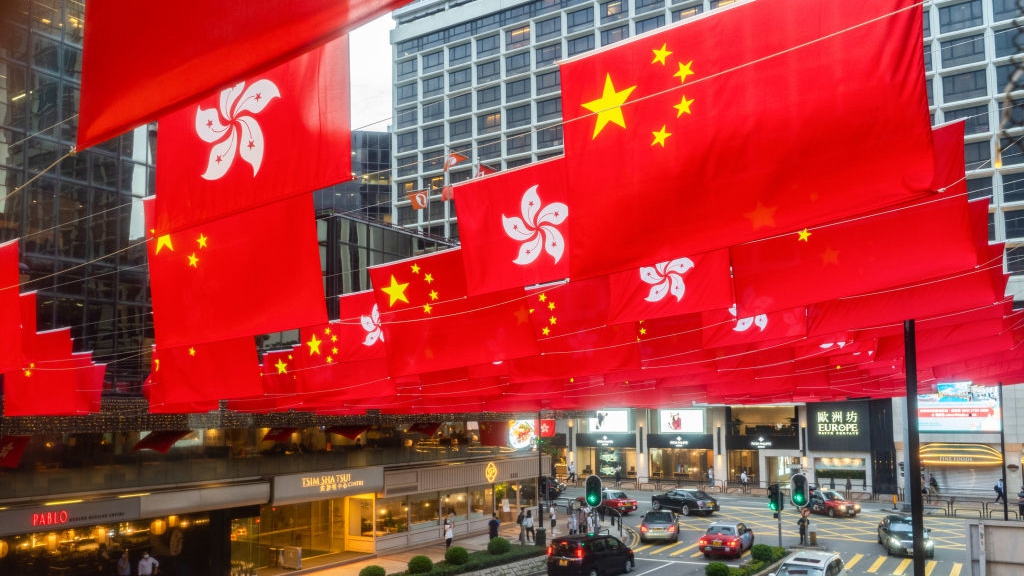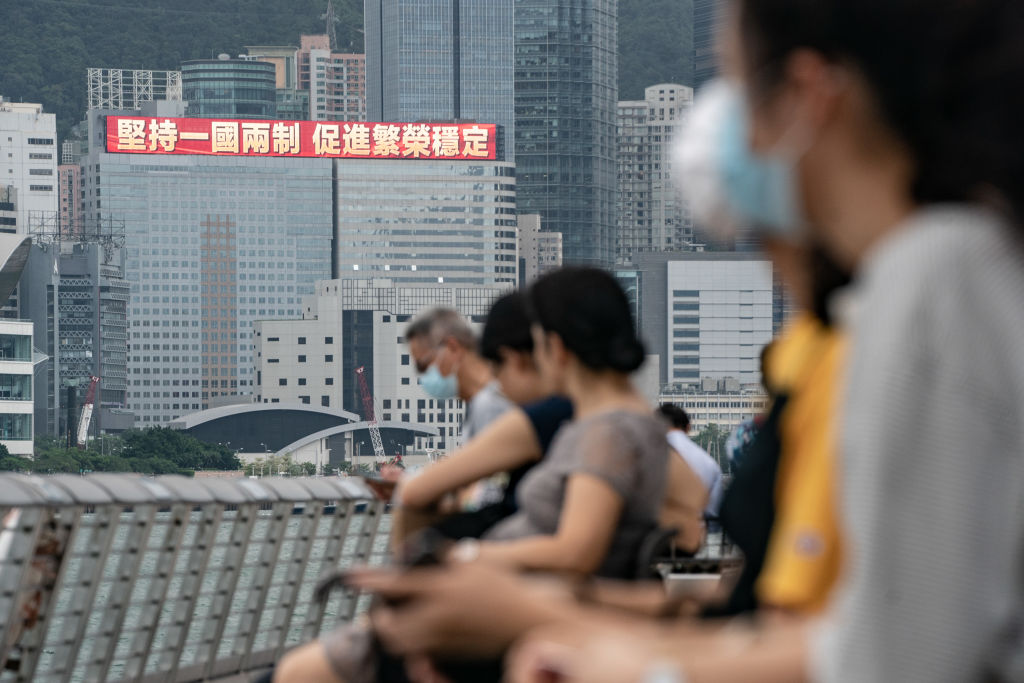
Flags are displayed outside a building ahead of July 1st anniversaries of Hong Kong's return to China and the centenary of the Communist Party of China in Hong Kong, China, June 29, 2021. /Getty
Flags are displayed outside a building ahead of July 1st anniversaries of Hong Kong's return to China and the centenary of the Communist Party of China in Hong Kong, China, June 29, 2021. /Getty
Editor's note: Grenville Cross, a senior counsel and law professor, was previously director of public prosecutions of the Hong Kong Special Administrative Region (HKSAR), China. This is the fourth piece of our "Decoding China" series. The article reflects the author's opinions and not necessarily those of CGTN.
On July 1, Chinese President Xi Jinping, at the ceremony to celebrate the centenary of the Communist Party of China (CPC), reviewed its achievements and indicated the country's future direction.
While providing a broad historical sweep, Xi emphasized certain fundamentals, including China's commitment to world peace, development and order. Since its founding, he said, the CPC has prioritized the happiness of the Chinese people, and committed itself to the rejuvenation of the Chinese nation, which explains its longevity.
Although Xi referenced China's "splendid civilization of over 5,000 years of history," he was also acutely aware of the humiliations of the past.
In the 19th century, Western powers took advantage of a weak China by ruthlessly carving it up, even punishing it for acting against the opium trade which, while lucrative for foreign companies, caused untold misery to the Chinese people. It was compelled to accept unequal treaties, its wealth was siphoned into foreign coffers, and its people were impoverished. This, undoubtedly, was why Xi emphasized that those days are gone forever, and that "we will never allow any foreign force to bully, oppress, or subjugate us."
While placing China's aspirations in their overall context, Xi outlined how its two special administrative regions would develop. He said "we will stay true to the letter and spirit of the principle of 'One Country, Two Systems', under which the people of Hong Kong administer Hong Kong, and the people of Macao administer Macao, both with high degree of autonomy."
The central government, Xi emphasized, would exercise "overall jurisdiction" over both places, an assurance which reflects their respective Basic Laws, under which they are local administrative regions of China, coming directly under the central people's government.
Although Xi did not flag up Hong Kong's recent difficulties, he acknowledged the importance of having arrangements in both places to "safeguard national security," which involves protecting China's sovereignty, security and development interests. Once social stability is ensured, "lasting prosperity and stability" will, he stressed, be achievable in both Hong Kong and Macao, which is reassuring for everyone who lives there.
The "One Country, Two Systems" principle is designed to facilitate the peaceful reunification of the country. It achieved an end to colonial rule in both Hong Kong and Macao, while maintaining their capitalist systems and ways of life, and their Basic Laws provide a legal basis for the "One Country, Two Systems" principle. Indeed, former Chinese leader Deng Xiaoping described the Basic Law of Hong Kong, the first of its kind, as a "law of historic and international significance," and "a creative masterpiece."
After 1997, however, some people, both locally and abroad, saw Hong Kong's reunification with the motherland somewhat differently. They treated its high degree of autonomy as a pretext for behaving contemptuously towards the rest of the country, and as akin to semi-independence.

Banners display messages celebrating the centenary of the CPC and the anniversary of Hong Kong's return to China atop a building in Hong Kong, China, June 30, 2021. /Getty
Banners display messages celebrating the centenary of the CPC and the anniversary of Hong Kong's return to China atop a building in Hong Kong, China, June 30, 2021. /Getty
When, for example, the central government confirmed its "comprehensive jurisdiction" over Hong Kong in a white paper in 2014, there were howls of protest from the Bar Association and others, and foreign meddling was common.
The EU, the UK and the U.S. actively sought to influence Hong Kong's affairs, by, for example, pressurizing its government over its national security proposals in 2003, and over its fugitive surrender proposals in 2019. They imagined that the "One Country, Two Systems" principle entitled them to interfere, but they were sorely mistaken.
In the Basic Laws of both Hong Kong and Macao, rights and responsibilities are described, including the obligation of each to enact national security laws on their own. Whereas Macao achieved this by 2009, 10 years after its reunification, Hong Kong was unable to do so, despite an attempt in 2003.
By 2019, 22 years after reunification, it still had no national security laws, and this was exploited by anti-China forces. They hoped, through violence, to topple the government, destroy the "One Country, Two Systems" principle, and harm China, and although they failed, it was not for want of trying.
The insurrection, of course, was fanned by the U.S. and other Western governments, afraid of China's rise and growing influence. With its opening-up and engagement with the wider world, China has achieved a global status which would have been unimaginable even just a few years ago, and its geopolitical rivals are panicking. They imagined that if, through their local proxies, they could destabilize Hong Kong, this would weaken China and distract it, but, although thwarted for the time being, they have not given up.
With Beijing's support, Hong Kong has not only survived the depredations of those who wish China ill, but got itself back on track. Instead of changing course, the central government stood firm and gave the city the tools it needs to protect itself and ensure a bright future.
As Xi has placed his faith in Hong Kong, its people must now reciprocate, and prove their worth to the Chinese nation.
(If you want to contribute and have specific expertise, please contact us at opinions@cgtn.com.)

